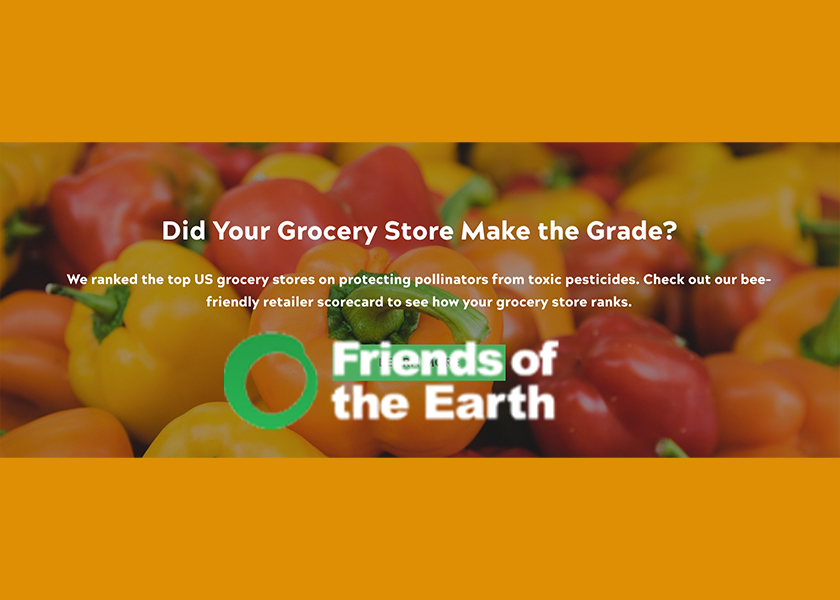How 25 supermarkets rank on the Bee-Friendly Retailer Scorecard

How did 25 of the largest U.S. grocery retailers rank in pesticide and pollinator protection in their food and beverage supply chains?
The Bee-Friendly Retailer Scorecard reveals the rankings. It’s created by Friends of the Earth, a 501-c3 nonprofit environmental protection and conservation organization based in Washington D.C., according to a news release.
“Grocery stores will feel the sting of widespread pesticide use in their supply chains if they don’t take action immediately,” Friends of the Earth Senior Scientist Kendra Klein said in the release. “From the decimation of pollinator populations to the devastation of soil life, reducing pesticide use is a key solution to the biodiversity and climate crises that threaten our food supply. We call on food retailers to lead the way.”
Stars
A shining star is Giant Eagle — the only major U.S. food retailer to make a timebound commitment to eliminate key pesticides of concern in part of its supply chain.
The company’s policy states it will eliminate the use of nitroguanidine neonicotinoids — banned in the European Union since 2018, but still allowed in the U.S. — from its produce supply chain by 2025.
Friends of the Earth says research shows U.S. agriculture has become 48 times more toxic to bees and other beneficial insects since neonicotinoids were introduced in the 1990s.
Two companies, CVS and Southeastern Grocers, established new policies in 2022 to encourage suppliers to eliminate or reduce the use of key toxic pesticides that harm pollinators and other beneficial insects that are critical to our food security — neonicotinoids, organophosphates and glyphosate.
The Scorecard campaign is supported by more than 100 beekeeping, farming, farmworker, consumer and environmental organizations, including Campaign for Healthier Solutions, which works with our largest dollar store Chains — Dollar General, Dollar Tree, Family Dollar and 99 Cents Only — on phasing out harmful chemicals.
Supermarkets have a lot of power to effect change.
Together, the 25 evaluated companies controlled $1.78 trillion in food and beverage sales in 2021, according to the release. The four largest — Walmart, Amazon, Costco and Kroger — controlled $1.02 trillion.
Organics
In the Scorecard, companies were also evaluated based on organic offerings.
A three-year study by Lund University researchers shows that organic farming can help reverse pollinator declines and can support up to 50% more pollinating species than conventional agriculture when correct landscape scale is incorporated. Two companies, Whole Foods and Trader Joe’s, have answered Friends of the Earth’s request to expand organic offerings to 15% of overall sales by 2025.
Pollinators are a cornerstone to a dependable food supply, enabling the production of many fruits, vegetables and nuts. And because bees pollinate alfalfa and other feed crops eaten by cows, even the dairy and meat shelves would look bare if pollination couldn’t happen.
Friends of the Earth encourages food companies to recognize that reducing toxic pesticides can help achieve the biodiversity, climate, health and labor protection goals of their ESG, or environmental and social governance, programs.
Addressing pesticides is also important to meeting consumer expectations: 74% of Americans believe grocery stores should support efforts to protect pollinators, according to a YouGov poll commissioned by Friends of the Earth. Also, 83% of customers believe it is important to eliminate pesticides that are harmful to pollinators from agriculture.
While agriculture accounts for the vast majority of pesticide use, the Scorecard also awarded points to 12 companies for complementary policies in their home and garden supply chains, including credit to Dollar Tree, for ending sales of neonicotinoid and glyphosate products for outdoor use, joining six other companies that have already done so.
All of these retailer commitments follow a multiyear effort led by Friends of the Earth and allies that aims to address the use of toxic pesticides in the food system.
The same pesticides that threaten pollinators also harm human health, including the farmworkers and rural communities on the frontlines of exposure, according to the release. And these same chemicals threaten the soil life that is needed to build healthy soils that sequester more carbon, enhance farmers’ resilience to climate change, and conserve water.







